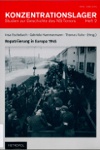Literature tips – Newsletter 8 – 2017
Literature tips
 Meyer, Beate: Fritz Benscher. Ein
Meyer, Beate: Fritz Benscher. Ein
Holocaust-Überlebender als Rundfunk- und Fernsehstar in der Bundesrepublik,
Göttingen − Wallstein 2017
Jew, concentration camp survivor,
Hamburg native in Bavaria, yet still a favorite of the public: the actor and
quizmaster Fritz Benscher. “Unfortunately, the ‘Fuehrer’ didn’t like me very
much.” This is how Fritz Benscher (1904–1970) describes the years following
1933 and his imprisonment in the concentration camps of Theresienstadt,
Auschwitz, and Dachau. He was finally liberated in Allach on May 1, 1945.
During the Weimar Republic,
Benscher gained his first experience in theater and with the still novel radio.
After the liberation, he was senior director of Radio Munich, which later became
the Bayerischer Rundfunk (Bavarian Broadcasting). He dedicated himself to
reeducating his fellow countrymen with his acerbic wit and revelations of Nazi
crimes. Later he staunchly fought against rearmament despite the prohibitions
against speaking and other sanctions imposed on him. Although many took offense
at his contributions, most of his listeners loved him. He continued his
television career with undiminished success in the 1960s as a moderator,
quizmaster, and actor.
Beate Meyer, a research assistant
of many years’ standing at the Institute for the History of the German Jews in
Hamburg, recounts Fritz Benscher’s life knowledgeably and in great detail. For
this purpose, she analyzed a many newspaper articles and archived materials,
also talking to companions of Fritz Benscher. This produced an easily readable,
stimulating book on an extraordinary entertainer, while providing en passant a history of the beginnings
of radio and television in the Federal Republic of Germany.
 Eschebach, Insa; Hammermann, Gabriele; Rahe, Thomas (eds.): Repatriierung in Europa 1945. Berlin − Metropol 2016
Eschebach, Insa; Hammermann, Gabriele; Rahe, Thomas (eds.): Repatriierung in Europa 1945. Berlin − Metropol 2016
(=Konzentrationslager. Studien zur Geschichte des NS-Terrors, Vol. 2)
The repatriation
of liberated concentration camp inmates, prisoners of war, and forced laborers
was a complex process closely related to several historic developments during
the period immediately following the war. This applies, for instance, to the
subsequent history of the liberated camps, the history of displaced persons and
the camps established for them in the East and the West, to the exodus and
migration in the period immediately following the war, or to the East-West
conflict, which soon escalated to become the Cold War.
The national
contexts of the repatriations in the early days of the Cold War have only
recently begun to receive the attention of historical research. The second issue
of the journal “Konzentrationslager. Studien zur Geschichte des NS-Terrors”
(“Concentration Camps. Studies on the history of the Nazi terror”) takes up the
return of former concentration camp inmates, political prisoners, and forced
laborers to their homelands in Western, Eastern, or Southern Europe, which was
largely organized, but also frequently accomplished on their own initiative.
The focus of the articles collected here is on the repatriation of the men and
women liberated from Nazi camps.
The respective articles not only look at
organizational and political questions of the repatriations and the agencies
involved, but also at the fates of individual groups of liberated concentration
camp inmates. Both the situations in the specific camps after their liberation
as well as in the countries to which the survivors returned are examined. In
the process, it becomes clear that they could by no means count on being
received “with open arms”. Instead, they were often met with disapproval, up to
and including open hostility. Most of the individual articles methodically
pursue a biographical approach, which also gives contemporary witnesses a
chance to speak. The issue is rounded off by two articles, one on the building
history of the concentration camps, and the other on the changes in discussions
of war guilt in present-day German commemorative culture. Thanks to the
in-depth researching of its sources, this volume brings to light many new
details on an important topic of the period immediately following the war.
